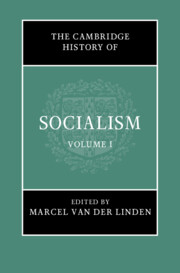Book contents
- The Cambridge History of Socialism
- The Cambridge History of Socialism
- The Cambridge History of Socialism
- Copyright page
- Contents
- Figures
- Maps
- Tables
- Contributors to Volume I
- Abbreviations
- Introduction to Volume I
- Part I Beginnings
- Egalitarianism
- 1 Mazdak and Late Antique ‘Socialism’
- 2 Egalitarianism in Islamic Thought and Praxis
- 3 Egalitarianism in Europe: Hussites, Anabaptists, Racovians, Hutterites, and Diggers
- 4 The Taiping Land Programme: Creating a Moral Environment
- Early Socialisms
- The Arrival of the Hostile Siblings: Marxism and Anarchism
- Part II Negating State Power
- Index
- References
4 - The Taiping Land Programme: Creating a Moral Environment
from Egalitarianism
Published online by Cambridge University Press: 03 November 2022
- The Cambridge History of Socialism
- The Cambridge History of Socialism
- The Cambridge History of Socialism
- Copyright page
- Contents
- Figures
- Maps
- Tables
- Contributors to Volume I
- Abbreviations
- Introduction to Volume I
- Part I Beginnings
- Egalitarianism
- 1 Mazdak and Late Antique ‘Socialism’
- 2 Egalitarianism in Islamic Thought and Praxis
- 3 Egalitarianism in Europe: Hussites, Anabaptists, Racovians, Hutterites, and Diggers
- 4 The Taiping Land Programme: Creating a Moral Environment
- Early Socialisms
- The Arrival of the Hostile Siblings: Marxism and Anarchism
- Part II Negating State Power
- Index
- References
Summary
The Heavenly Kingdom of Great Peace sprang from a Chinese Christian evangelical movement with close affinities, but no institutional ties, to evangelical Protestantism in the United States, Great Britain, and the European continent. It originated with a vision of its later leader Hong Xiuquan in 1837, in which he was taken up to heaven and was ordered by an ‘old man’ to drive out of the heavens the demons who had taken possession of them. After he had accomplished this feat, the ‘old man’, who originally had created the world, ordered him to descend back down to earth and do the same, that is, drive out the demons, who had not only established control there, but had done so with the connivance of many members of the Confucian elite.
- Type
- Chapter
- Information
- The Cambridge History of Socialism , pp. 101 - 125Publisher: Cambridge University PressPrint publication year: 2022



